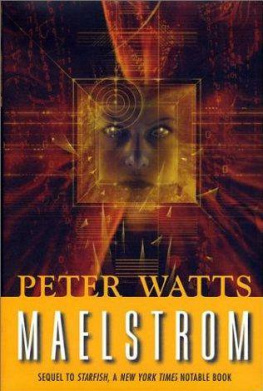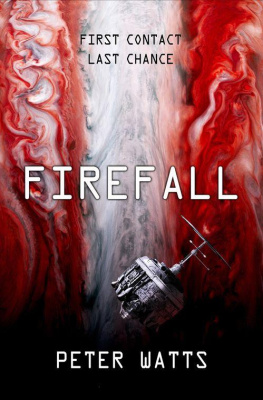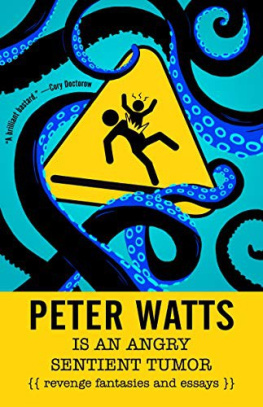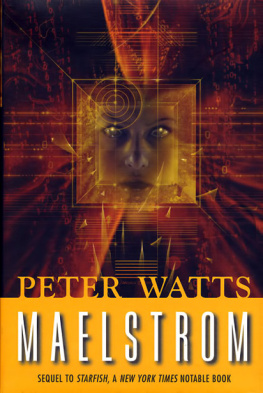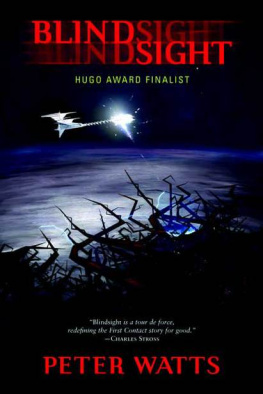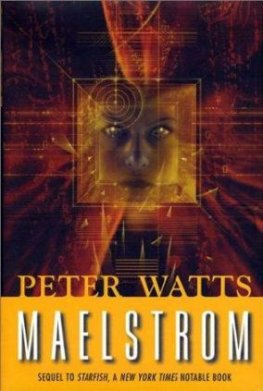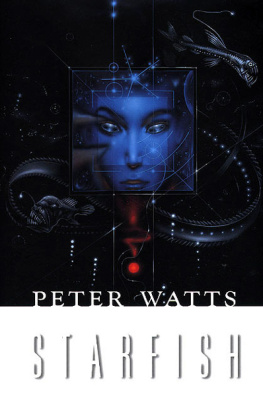
In memory of Strange Cat, a.k.a. Carcinoma,
19842003
She wouldn't have cared.
And in memory of Chuckwalla,
19942001
A victim of technology run amok.
This is the way it was meant to be. Well, not all pixellated and virtual or (at best) home-printed, but integrated, dammit, a single novel in a single package, and fuck the beancounters and their Solomonesque book-splitting travesties. We aren't in the old-school economy any more, Toto we're giving this stuff away now, and you can judge it for better or worse as a single standalone entity. You may agree with Publisher's Weekly and call this the capstone to one of the major works of hard-sf in the new century. Or you may side with Kirkus and dismiss it as horrific porn, rife with relentlessly clinical scenes of sexual torture. (Hell, you may even decide they're both right.) But whatever you decide, at least you'll be basing that assessment, finally, on complete data.
Peter Watts, 2007
If you lost your eyes, Achilles Desjardins had been told, you got them back in your dreams.
It wasn't only the blind. Anyone, torn apart in life, dreamt the dreams of whole creatures. Quadruple amputees ran and threw footballs; the deaf heard symphonies; those who'd lost, loved again. The mind had its own inertia; grown accustomed to a certain role over so many years, it was reluctant to let go of the old paradigm.
It happened eventually, of course. The bright visions faded, the music fell silent, imaginary input scaled back to something more seemly to empty eye sockets and ravaged cochleae. But it took years, decadesand in all that time, the mind would torture itself with nightly reminders of the things it once had.
It was the same with Achilles Desjardins. In his dreams, he had a conscience.
Dreams took him to the past, to his time as a shackled god: the lives of millions in his hands, a reach that extended past geosynch and along the floor of the Mariana Trench. Once again he battled tirelessly for the greater good, plugged into a thousand simultaneous feeds, reflexes and pattern-matching skills jumped up by retro'd genes and customized neurotropes. Where chaos broke, he brought control. Where killing ten would save a hundred, he made the sacrifice. He isolated the outbreaks, cleared the logjams, defused the terrorist attacks and ecological breakdowns that snapped on all sides. He floated on radio waves and slipped through the merest threads of fiberop, haunted Peruvian sea mills one minute and Korean Comsats the next. He was CSIRA's best 'lawbreaker again: able to bend the Second Law of Thermodynamics to the breaking point, and maybe a little beyond.
He was the very ghost in the machineand back then, the machine was everywhere.
And yet the dreams that really seduced him each night were not of power, but of slavery. Only in sleep could he relive that paradoxical bondage that washed rivers of blood from his hands. Guilt Trip, they called it. A suite of artificial neurotransmitters whose names Desjardins had never bothered to learn. He could, after all, kill millions with a single command; nobody was going to hand out that kind of power without a few safeguards in place. With the Trip in your brain, rebellion against the greater good was a physiological impossibility. Guilt Trip severed the link between absolute power and corruption absolute; any attempt to misuse one's power would call down the mother of all grand mal attacks. Desjardins had never lain awake doubting the rightness of his actions, the purity of his motives. Both had been injected into him by others with fewer qualms.
It was such a comfort, to be so utterly blameless. So he dreamed of slavery. And he dreamed of Alice, who had freed him, who had stripped him of his chains.
In his dreams, he wanted them back.
Eventually the dreams slipped away as they always did. The past receded; the unforgiven present advanced. The world fell apart in time-lapse increments: an apocalyptic microbe rose from the deep sea, hitching a ride in the brackish flesh of some deep-sea diver from N'AmPac. Floundering in its wake, the Powers That Weren't dubbed it ehemoth, burned people and property in their frantic, futile attempts to stave off the coming change of regime. North America fell. Trillions of microscopic foot soldiers marched across the land, laying indiscriminate waste to soil and flesh. Wars flared and subsided in fast-forward: the N'AmPac Campaign, the Colombian Burn, the Eurafrican Uprising. And Rio, of course: the thirty-minute war, the war that Guilt Trip should have rendered impossible.
Desjardins fought in them all, one way or another. And while desperate metazoans fell to squabbling among themselves, the real enemy crept implacably across the land like a suffocating blanket. Not even Achilles Desjardins, pride of the Entropy Patrol, could hold it back.
Even now, with the present almost upon him, he felt faint sorrow for all he hadn't done. But it was phantom pain, the residue of a conscience stranded years in the past. It barely reached him here on the teetering interface between sleep and wakefulness; for one brief moment he both remembered that he was free, and longed not to be.
Then he opened his eyes, and there was nothing left that could care one way or the other.
Mandelbrot sat meatloafed on his chest, purring. He scritched her absently while calling up the morning stats. It had been a relatively quiet night: the only item of note was a batch of remarkably foolhardy refugees trying to crash the North American perimeter. They'd set sail under cover of darkness, casting off from Long Island on a refitted garbage scow at 0110 Atlantic Standard; within an hour, two dozen EurAfrican interests had been vying for dibs on the mandatory extreme prejudice. The poor bastards had barely made it past Cape Cod before the Algerians (the Algerians?) took them out.
The system hadn't even bothered to get Desjardins out of bed.
Mandelbrot rose, stretched, and wandered off on her morning rounds. Liberated, Desjardins got up and padded to the elevator. Sixty-five floors of abandoned real estate dropped smoothly around him. Just a few years ago it had been a hive of damage control; thousands of Guilt-Tripped operatives haunting a world forever teetering on the edge of breakdown, balancing lives and legions with cool dispassionate parsimony. Now it was pretty much just him. A lot of things had changed after Rio.
The elevator disgorged him onto CSIRA's roof. Other buildings encircled this one in a rough horseshoe, pressing in at the edges of the cleared zone. Sudbury's static field, its underbelly grazing the tips of the tallest structures, sent gooseflesh across Desjardins's forearms.
On the eastern horizon, the tip of the rising sun ignited a kingdom in ruins.
The devastation wasn't absolute. Not yet. Cities to the east retained some semblance of integrity, walled and armored and endlessly on guard against the invaders laying claim to the lands between. Fronts and battle lines still seethed under active dispute; one or two even held steady. Pockets of civilization remained sprinkled across the continentnot many, perhaps, but the war went on.
All because five years before, a woman named Lenie Clarke had risen from the bottom of the ocean with revenge and ehemoth seething together in her blood.
Now Desjardins walked across the landing pad to the edge of the roof. The sun rose from the lip of the precipice as he pissed into space. So many changes, he reflected. So many fold catastrophes in pursuit of new equilibria. His domain had shrunk from a planet to a continent, cauterised at the edges. Eyesight once focused on infinity now ended at the coast. Arms which once encircled the world had been amputated at the elbow. Even N'Am's portion of the Net had been cut from the electronic commons like a tumor; Achilles Desjardins got to deal with the necrotising mess left behind.
Next page

